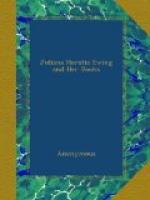Now mind you come—if only to see my Nelson (bureau) Relic!! It is such a comfort to me and my papers!
Ever your most loving sister,
J.H.E.
TO MRS. ELDER.
X Lines, South Camp. August 7, 1874.
MY DEAR AUNT HORATIA,
I have begged the Tiger Tom for you!
He is the handsomest I ever saw, with such a head! His name is Peter. [Sketch.]
Nothing—I assure you, can exceed his beauty—or the depth of his stripes....
If I had not too many cats already I should have adopted Peter long ago. We always quote William Blake’s poem to him when we see him prowling about our garden.
“Tiger! Tiger!
burning bright,
In the forest of the night,
What immortal Hand and Eye
Framed thy fearful symmetry?”
Do you remember it?
I feel quite a wretch not to like your “Ploughman"[39] as well as usual. There is always poetry in your things, but TO ME the spirit of this one has not quite that reality which is the highest virtue of “a sentiment”—or at least its greatest strength. But I may be wrong. Only that kind of constant lifting of the soul from the labour of daily drudgery to the Father of our spirits seems to me one of the highest, latest, and most refined Christian Graces in natures farthest removed from “the ape and tiger,” and most at leisure for contemplative worship. I know there are exceptions. Rural contemplative saints among shepherds and ploughmen. But that the agricultural labourer as a type seeks “Nature’s God” at the plough-tail and in the bosom of his family I fear is not the case—and it would be very odd if poverty and ignorance did lead to such results, even in the advantages of an “open-air” life. Perhaps Burns knew such a Cottar on Saturday Nights as he painted—he wasn’t sick himself! unless you interpret a neet wi’ Burns by that poem!—and there has been one contemplative Shepherd on Salisbury Plain—though the proverb says—
“Salisbury Plain
Is seldom without a thief
or twain.”
—not I believe supposed to refer to highwaymen!! and agricultural labourers stand (among trades) statistically high (or low!) for the crime of murder.
[Footnote 39: Sonnet by H.S. Elder, Aunt Judy’s Magazine.]
But I won’t inflict any more rigmarole on you, because of an obstinate conviction in my inside that dear Mother was right in the idea that it is the learned—not the ignorant—who wonder, and that the ploughman feels no wonder at all in the glory of the rising sun—though YOUR mind might overflow with awe and admiration. As to the last verse—that a “cot” should ever be “cheerful” which “serves him for” washhouse, kitchen, nursery and all—is a triumph of the “softening influence of use”—and I concede it to you! But where “he reigns as a king his toils forgot” is, I am convinced, at the Black Bull with highly-drugged beer!!!!!!




